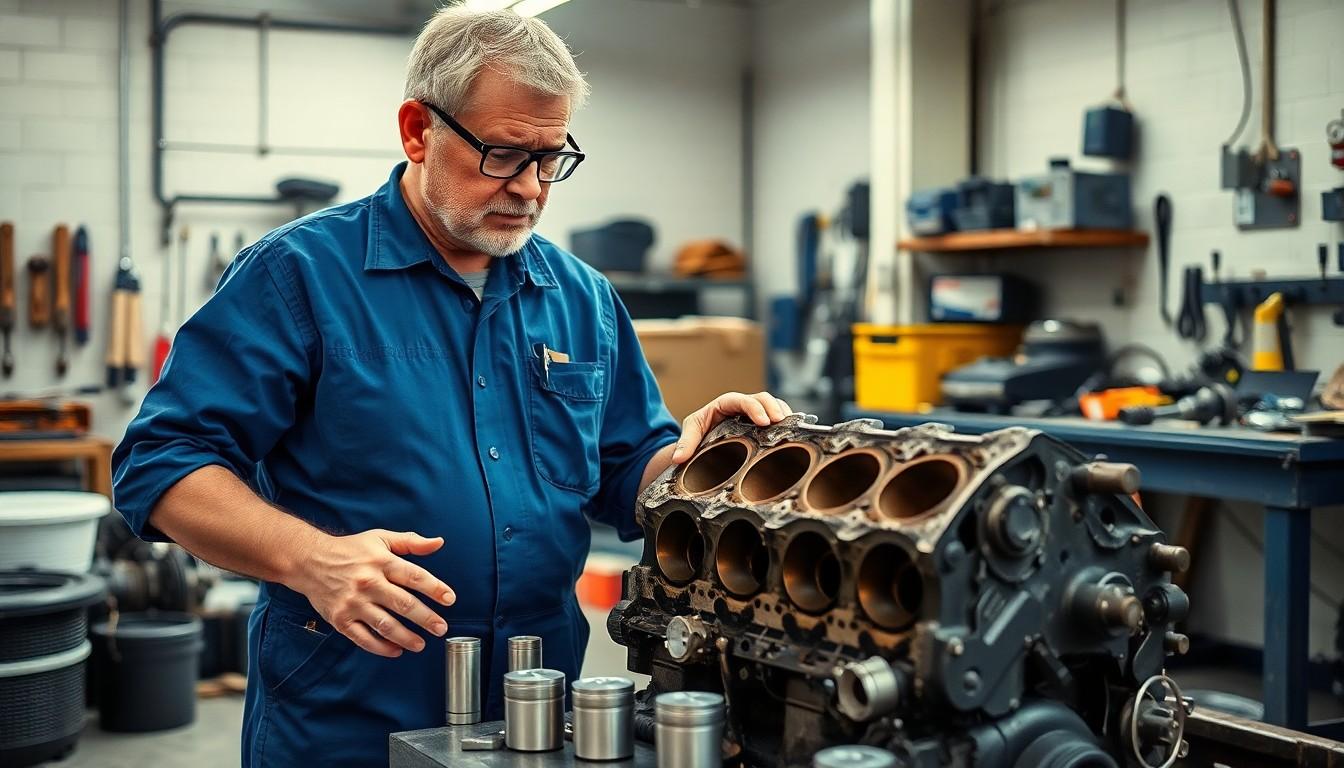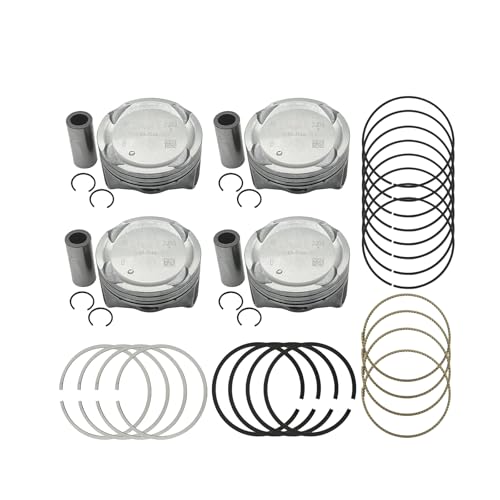When your engine starts making unusual noises or losing power, a damaged piston might be the culprit. We know that facing potential piston replacement can be stressful—not just mechanically but financially. Many vehicle owners wonder about the costs involved before committing to this important repair.
The price of replacing a piston varies widely depending on several factors including your vehicle type, whether you’re replacing a single piston or the complete set, and if you choose DIY or professional service. While some smaller vehicles might cost as little as $900 for a single piston replacement, luxury or performance cars can run upwards of $5,000 for a complete job. We’ll break down these costs so you can make an well-informed choice about your vehicle’s repair.
Understanding Piston Replacement Costs
Piston replacement costs vary significantly depending on multiple factors. Labor charges typically account for 60-70% of the total expense, with mechanics charging between $80-150 per hour for this complex engine repair. Parts pricing differs based on vehicle make and model—standard pistons for economy cars cost $30-80 each, while performance or luxury vehicle pistons range from $100-300+ per unit.
Engine type dramatically impacts overall costs. Four-cylinder engines are generally less expensive to repair than six or eight-cylinder engines simply because fewer components need replacement. V8 engines often require $1,500-4,000 for complete piston replacement due to their complex design and additional labor hours.
Vehicle age and model influence pricing significantly. Newer vehicles with computerized systems require additional diagnostic time, potentially adding $100-200 to your final bill. Luxury and European models like BMW, Mercedes, and Audi typically command 30-50% higher repair costs compared to domestic or Japanese vehicles due to specialized parts and technical requirements.
Additional repairs often accompany piston replacement projects. Connecting rods ($50-150 each), piston rings ($20-50 per set), and gaskets ($10-100 depending on type) are commonly replaced simultaneously. Many mechanics recommend addressing these related components during piston work to prevent future failures and additional labor costs.
Factors That Affect Piston Replacement Cost
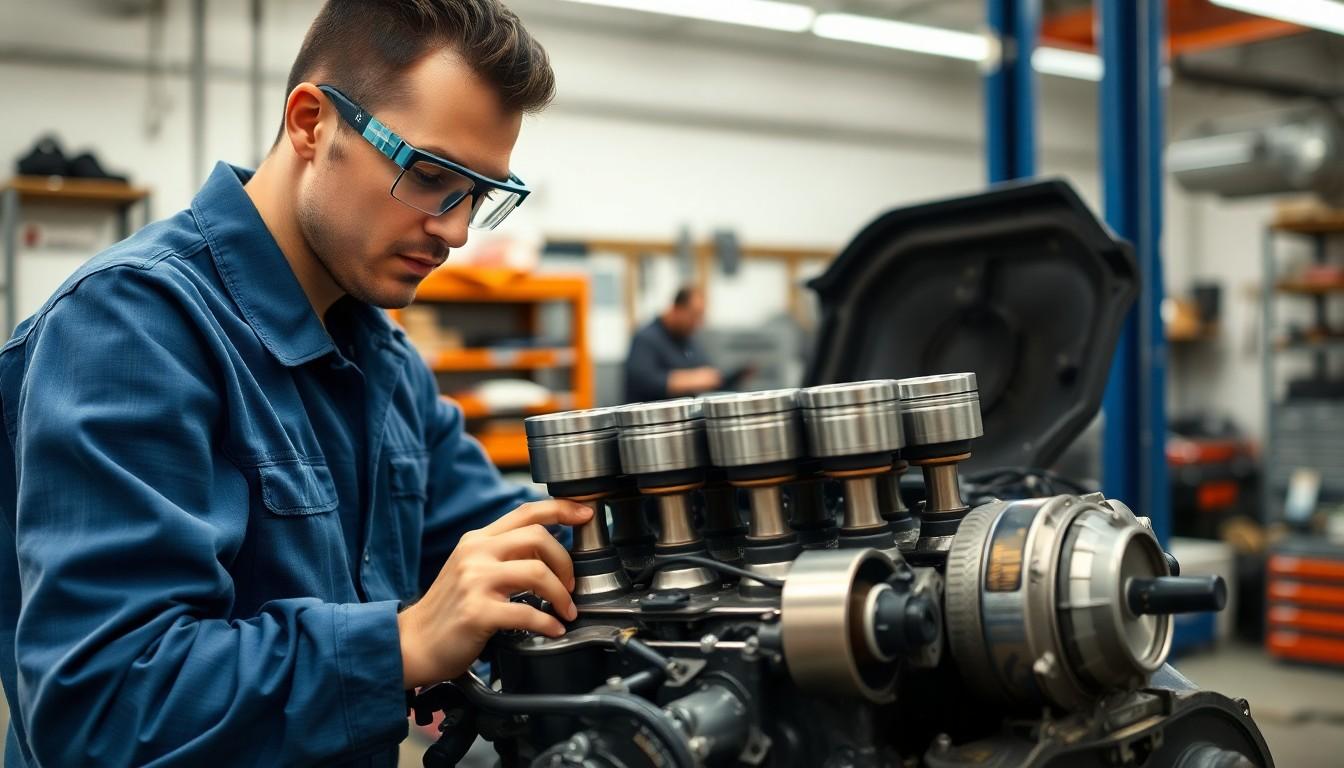
Piston replacement costs vary significantly based on several key factors. Understanding these variables helps vehicle owners anticipate expenses and make informed decisions about this major repair.
Engine Type and Size
Engine configurations directly impact the total replacement cost for pistons. A four-piston engine typically costs around $1,000 for replacement, while engines with more pistons can reach $2,000 or higher. Larger engines generally require more labor hours to disassemble and reassemble, increasing the overall expense. The complexity of certain engine designs also affects accessibility, potentially adding more labor time to the repair process.
Vehicle Make and Model
Different vehicles have unique piston designs and requirements that significantly influence pricing. Luxury and performance vehicles often incorporate specialized pistons that cost substantially more than those for standard models. The make and model determine not only the parts cost but also the labor complexity, with some vehicles requiring specialized tools or techniques for proper piston replacement. European and high-end Asian models typically command premium pricing for both parts and labor compared to domestic counterparts.
Number of Pistons Being Replaced
Replacing multiple pistons simultaneously can be more cost-effective than individual replacements. While the total expense increases with each additional piston, mechanics often offer labor discounts when performing multiple replacements during the same service. The combined parts cost for multiple pistons ranges widely from $200 to $1,000 per piston based on quality and vehicle specifications. Many mechanics recommend replacing pistons in pairs or complete sets to ensure balanced engine performance and prevent future failures.
Parts Quality and Brand
The quality tier and manufacturer of replacement pistons dramatically affect the overall cost. High-quality OEM or performance-grade pistons can cost two to three times more than standard aftermarket options. Premium brands offer enhanced durability, precision manufacturing, and often come with better warranties compared to budget alternatives. The parts selection also extends to related components like piston rings, gaskets, and bearings, which can add $50 to $200 to the total cost. Many professional mechanics recommend at least mid-grade parts to ensure reliability and prevent premature failure that could result in additional expenses down the road.
Average Cost Breakdown for Piston Replacement
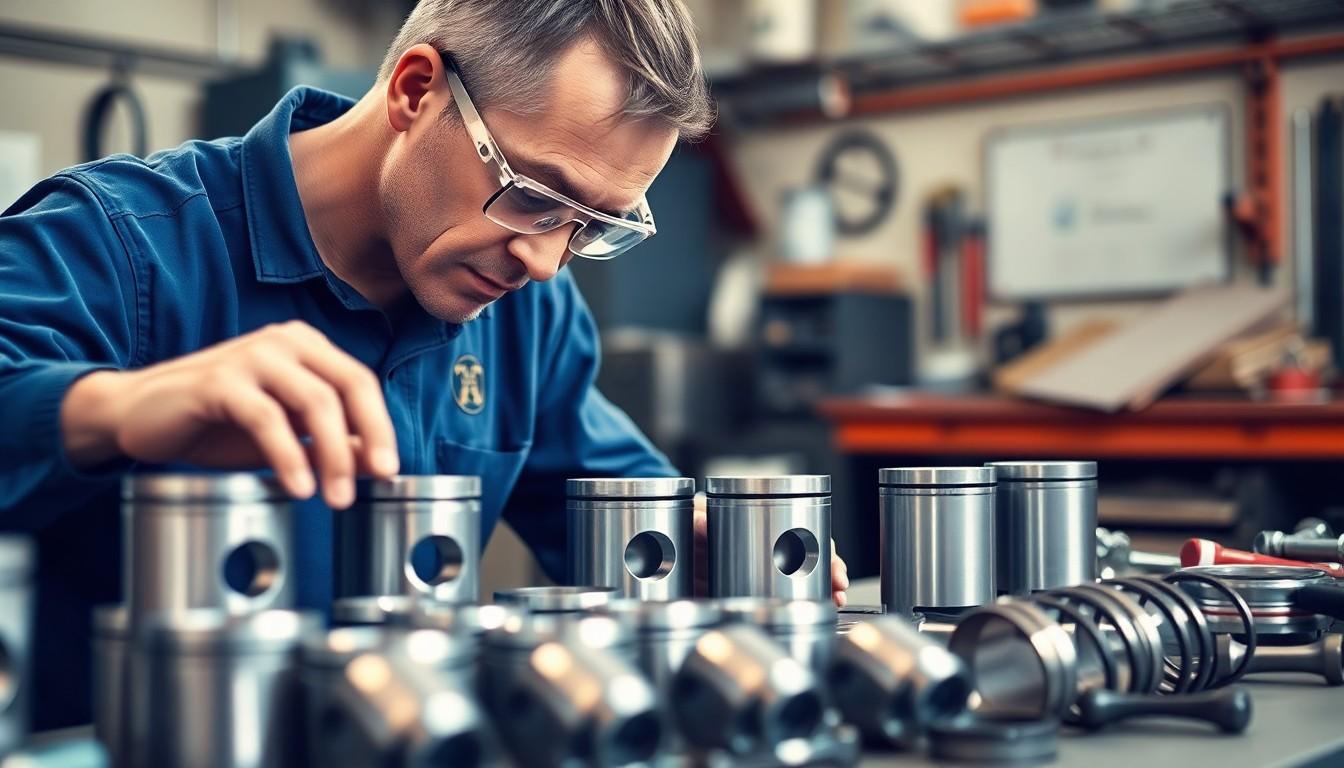
Piston replacement costs vary significantly based on several key factors including vehicle make, model, and engine complexity. Understanding the breakdown of these expenses helps vehicle owners prepare for this substantial repair.
Parts Cost Analysis
The components needed for piston replacement come with varying price points depending on quality and vehicle specifications. Individual pistons range from $10 to $730 each, with the price fluctuating based on the vehicle’s make and model. Piston rings typically cost between $40 and $200, serving as a critical component in the overall repair. Additional parts such as gaskets and related components add another $50 to $200 to the total parts expense. Many mechanics recommend replacing multiple related components simultaneously to prevent future issues and maximize the value of the labor investment already being made.
Labor Costs and Time Requirements
Labor represents the most substantial portion of piston replacement expenses, reflecting the complexity of this intensive repair. Mechanics charge between $400 and $1,200 for labor alone, with some specialized or complex engines commanding up to $4,000 in labor costs. The process involves removing the engine, complete disassembly, replacement of the affected parts, and reassembly – typically requiring at least 16 hours of professional work. This extensive time requirement explains why labor costs dominate the overall expense. For a standard 4-piston engine, total replacement costs (parts and labor combined) typically range from $1,000 to $2,000, though complex engines or premium vehicles can push this total to approximately $3,500. Replacing multiple pistons simultaneously often results in labor discounts since the engine is already disassembled, making it more cost-effective than addressing individual pistons over time.
DIY vs. Professional Piston Replacement
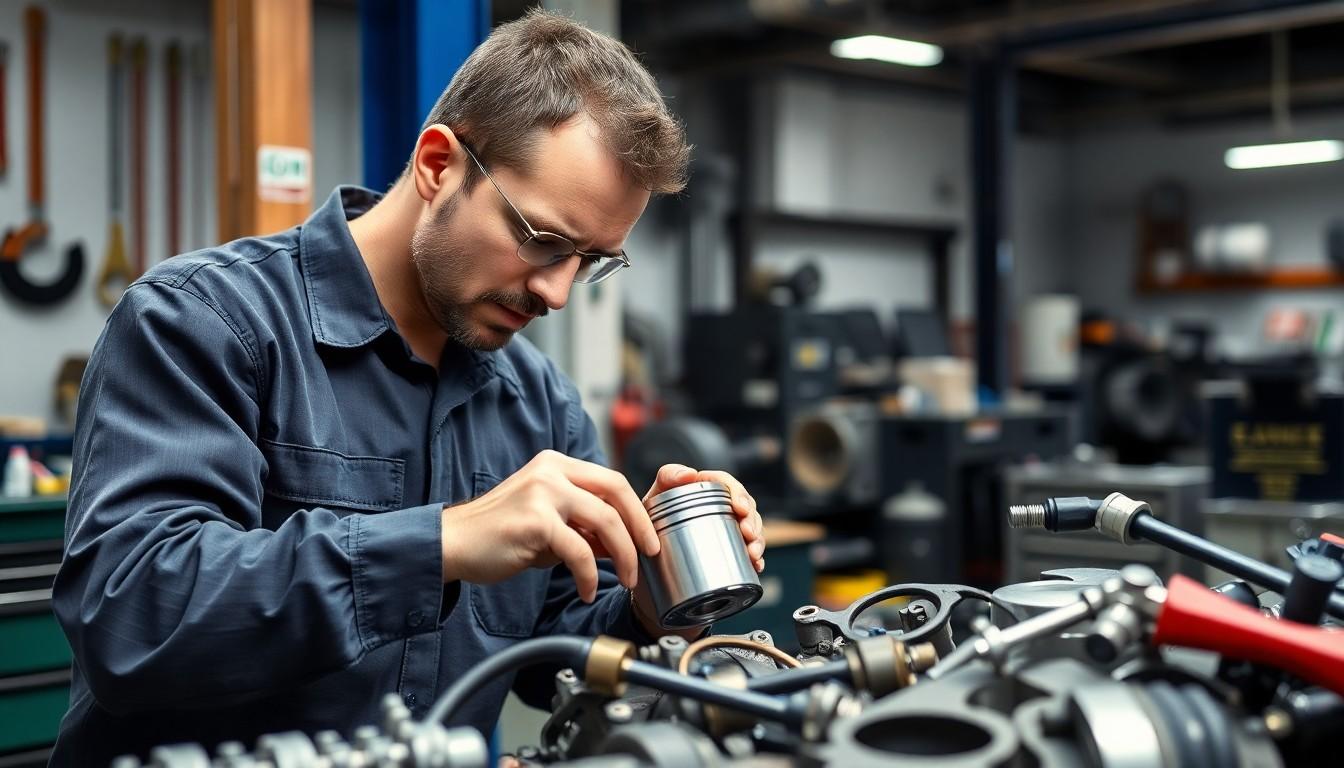
Deciding between a DIY approach and professional service for piston replacement involves careful consideration of your mechanical expertise, available tools, and the risks involved. This choice significantly impacts both cost and quality outcomes for your engine repair.
Tools and Skills Required for DIY
DIY piston replacement demands specialized tools and advanced mechanical knowledge that most casual mechanics don’t possess. Engine disassembly requires precision tools including piston ring compressors, torque wrenches, and potentially machine tools for cylinder honing or resizing. The process involves complete engine disassembly, which takes considerable time and requires understanding complex engine systems. Experienced mechanics develop their skills over years of practice, learning how to properly fit pistons without damaging cylinders or connecting rods. Mistakes during installation can lead to catastrophic engine failure, potentially turning a $1,000 repair into a $5,000+ engine replacement.
When to Choose Professional Service
Professional piston replacement offers important advantages that justify the $500-$4,000 labor costs typical for this service. Certified mechanics possess the technical expertise to identify collateral damage that might not be immediately apparent, such as worn cylinder walls or damaged connecting rods. Professionals have access to specialized diagnostic equipment and machine tools necessary for proper cylinder honing and precise measurements. They can complete the job more efficiently, typically in hours rather than the days it might take an amateur. Most repair shops offer warranties on their work, providing peace of mind and protection against future issues related to the repair. The complexity of modern engines, particularly in luxury or European vehicles, makes professional service the logical choice for most vehicle owners facing piston problems.
Signs You Need a Piston Replacement
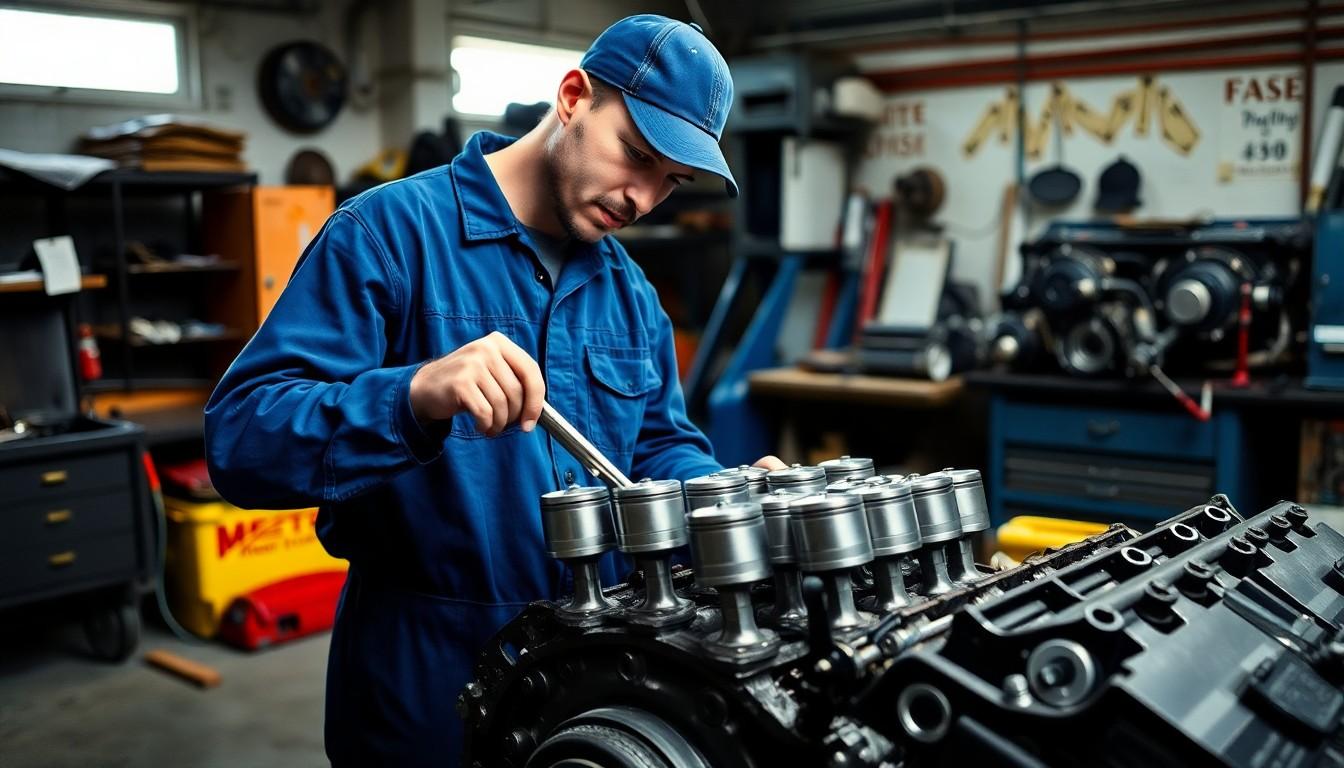
Identifying piston problems early can save you thousands in repair costs and prevent catastrophic engine failure. Several telltale signs indicate when your vehicle’s pistons may need replacement, ranging from unusual sounds to visible smoke issues.
Common Symptoms of Piston Damage
Engine knocking or clunking sounds often signal piston problems, indicating the piston isn’t moving smoothly within its cylinder. Excessive oil consumption is another clear warning sign, typically resulting from worn or damaged piston rings that can’t properly seal the combustion chamber. White smoke billowing from your exhaust pipe suggests engine oil is burning due to faulty pistons or piston rings. Decreased engine performance, including reduced power, poor acceleration, and lower fuel efficiency, commonly occurs when pistons aren’t functioning correctly. Engine overheating may also develop as piston damage can disrupt normal cooling processes.
Also, engine misfires happen when pistons fail to create proper cylinder sealing, disrupting the combustion process. Low compression readings during testing directly point to piston or ring issues affecting cylinder pressure. Metal shavings appearing in your engine oil indicate active wear of pistons or related components. Blue smoke from the exhaust specifically suggests oil burning from piston ring failure, allowing oil to enter the combustion chamber.
Diagnostic Procedures
Compression testing measures pressure inside engine cylinders, revealing potential leaks or piston issues with numerical precision. Leak-down testing pinpoints exactly where pressure escapes within the engine, such as between the piston and cylinder wall. Oil analysis identifies metal particles and contaminants that confirm piston wear before visible symptoms develop. Visual inspection requires engine disassembly but provides definitive evidence of piston condition and damage patterns. Modern vehicles benefit from scan tool diagnostics, which can retrieve error codes related to engine performance issues potentially stemming from piston problems.
These diagnostic methods help mechanics determine whether piston replacement is necessary rather than performing more minor repairs. The diagnostic process typically costs between $100 and $300 but saves much more by preventing incorrect repairs or overlooked damage.
Ways to Save Money on Piston Replacement

Piston replacement doesn’t have to expensive if you know where to look for savings. These strategies can help reduce your overall costs while ensuring quality work.
Finding Affordable Parts
Used or refurbished pistons offer important savings compared to new ones, with prices potentially 30-50% lower than retail. When shopping for these parts, verify they’re from a reputable source and compatible with your exact vehicle make and model. Aftermarket pistons provide another cost-saving alternative to OEM parts, often maintaining comparable quality while costing 20-40% less. Many auto parts suppliers sell piston kits that include rings and other necessary components at bundled prices, creating additional value compared to purchasing items separately.
Negotiating Labor Costs
Getting multiple quotes from different mechanics reveals pricing variations that can save hundreds of dollars on the same job. Independent repair shops typically charge 30-40% less for labor than dealership service centers, with hourly rates ranging from $80-120 compared to $120-150 at dealerships. Bundling piston replacement with other needed repairs often leads to discounted labor rates, as the mechanic can complete multiple tasks while the engine is already disassembled. Direct negotiations about labor rates frequently result in 5-15% discounts, especially for extensive jobs requiring 10-16 hours of work. Some shops offer payment plans or seasonal promotions that make the substantial labor costs (ranging from $500-$4,000) more manageable without compromising on quality.
Conclusion
Piston replacement is a important investment ranging from $900 to over $5,000 depending on your vehicle type engine complexity and repair scope. Understanding the breakdown between parts ($10-730 per piston plus additional components) and labor costs (often 60-70% of the total bill) helps prepare for this expense.
While DIY might seem appealing most vehicle owners benefit from professional service even though higher costs. Professional mechanics offer expertise specialized equipment and valuable warranties that protect your investment.
By recognizing early warning signs seeking proper diagnostics and exploring cost-saving strategies like aftermarket parts or bundled repairs you can manage this expense more effectively. Remember that addressing piston issues promptly often prevents more costly engine damage down the road.
Frequently Asked Questions
How much does it cost to replace a piston in a car?
Piston replacement costs vary widely based on vehicle type and number of pistons being replaced. For smaller vehicles, replacing a single piston might cost around $900, while luxury or performance cars could exceed $5,000 for a complete job. Labor typically accounts for 60-70% of the total expense, with mechanics charging $80-150 per hour. Individual pistons range from $10-730 depending on your vehicle make and model.
Is it worth replacing pistons in an older car?
The decision depends on your car’s overall value and condition. For older vehicles with lower market value, extensive piston repairs may exceed the car’s worth. However, if the car is otherwise in good condition and has sentimental value, replacing pistons might be justified. Consider getting a complete assessment of the engine’s condition and compare repair costs against the vehicle’s current market value before deciding.
What are the signs that a piston needs to be replaced?
Key indicators include unusual engine noises (knocking or ticking), excessive oil consumption, white smoke from the exhaust, decreased engine performance, overheating, and engine misfires. These symptoms suggest potential piston damage. If you notice any of these signs, professional diagnostic testing like compression tests, leak-down tests, and visual inspections (costing $100-300) can confirm whether piston replacement is necessary.
Can I replace a piston myself to save money?
While technically possible, DIY piston replacement is not recommended for most vehicle owners. It requires specialized tools, advanced mechanical knowledge, and precision that casual mechanics typically lack. Mistakes during installation can cause significant engine damage. Professional service, though more expensive, offers technical expertise, proper equipment, and work warranties, making it safer for modern, complex engines.
How long does it take to replace pistons?
A professional piston replacement job typically requires at least 16 hours of labor for a standard engine. The exact timeframe depends on engine complexity, accessibility, and whether additional components need replacement. Four-cylinder engines generally require less time than six or eight-cylinder engines. Luxury and European models often take longer due to their complex design and specialized parts.
Can I drive with a damaged piston?
Driving with a damaged piston is strongly discouraged. It can lead to catastrophic engine failure, causing significantly more expensive repairs or even requiring complete engine replacement. A damaged piston creates abnormal combustion, damages other engine components, and reduces fuel efficiency. If you suspect piston damage, have your vehicle towed to a repair shop rather than driving it.
Are aftermarket pistons as good as OEM pistons?
Quality aftermarket pistons from reputable manufacturers can offer performance comparable to OEM (Original Equipment Manufacturer) parts, often at 20-40% lower costs. However, quality varies significantly between brands. High-quality aftermarket pistons may even offer improved performance for specific applications. Research brands thoroughly and consult with a knowledgeable mechanic before choosing aftermarket options for your specific vehicle.
What other parts typically need replacement when replacing pistons?
When replacing pistons, mechanics often recommend replacing connecting rods, piston rings, gaskets, bearings, and sometimes the timing chain or belt. These additional components typically add $200-500 to the total cost but prevent future failures that would require disassembling the engine again. Bundling these repairs is cost-effective since most of the expense comes from the labor of accessing the pistons.

